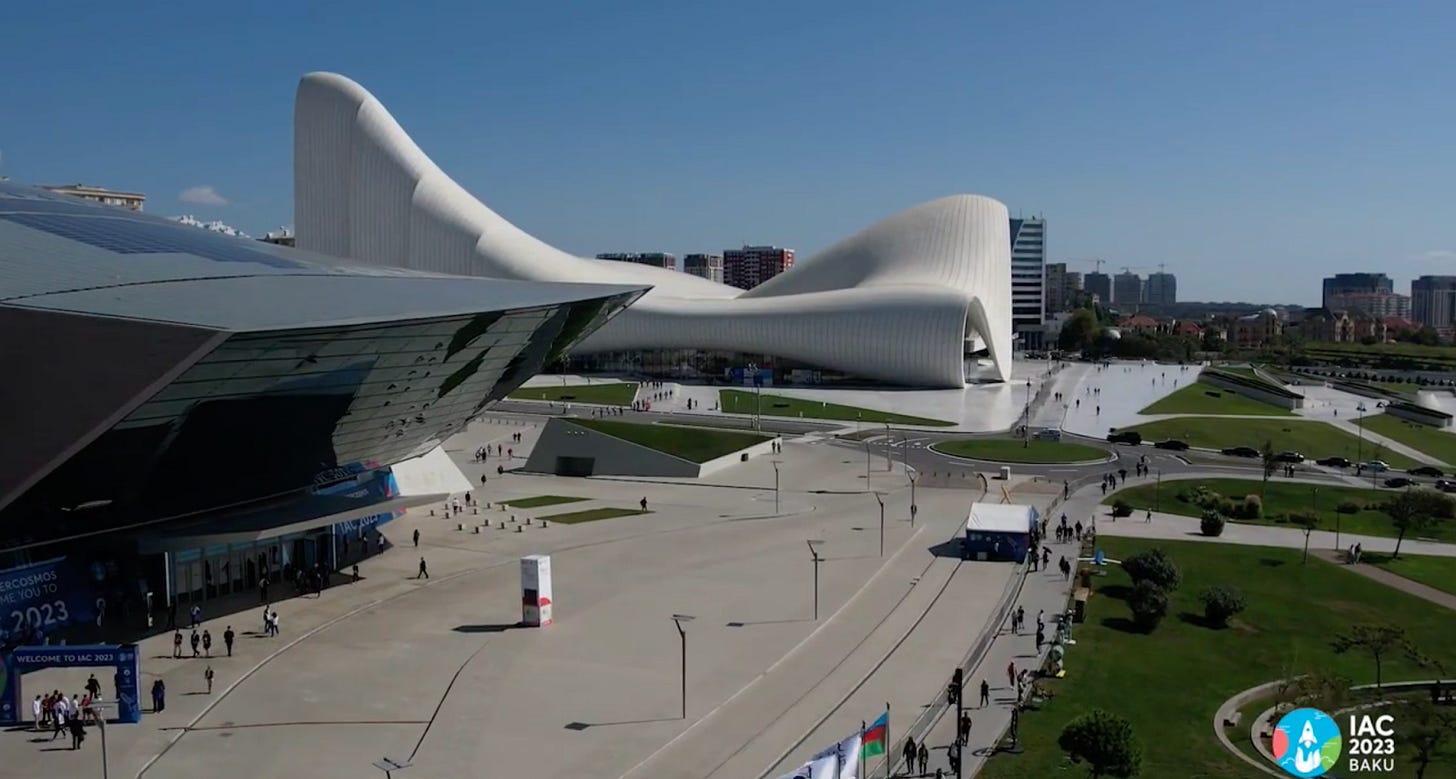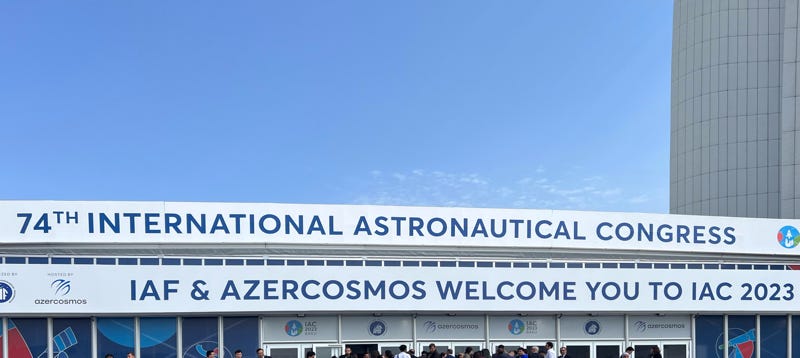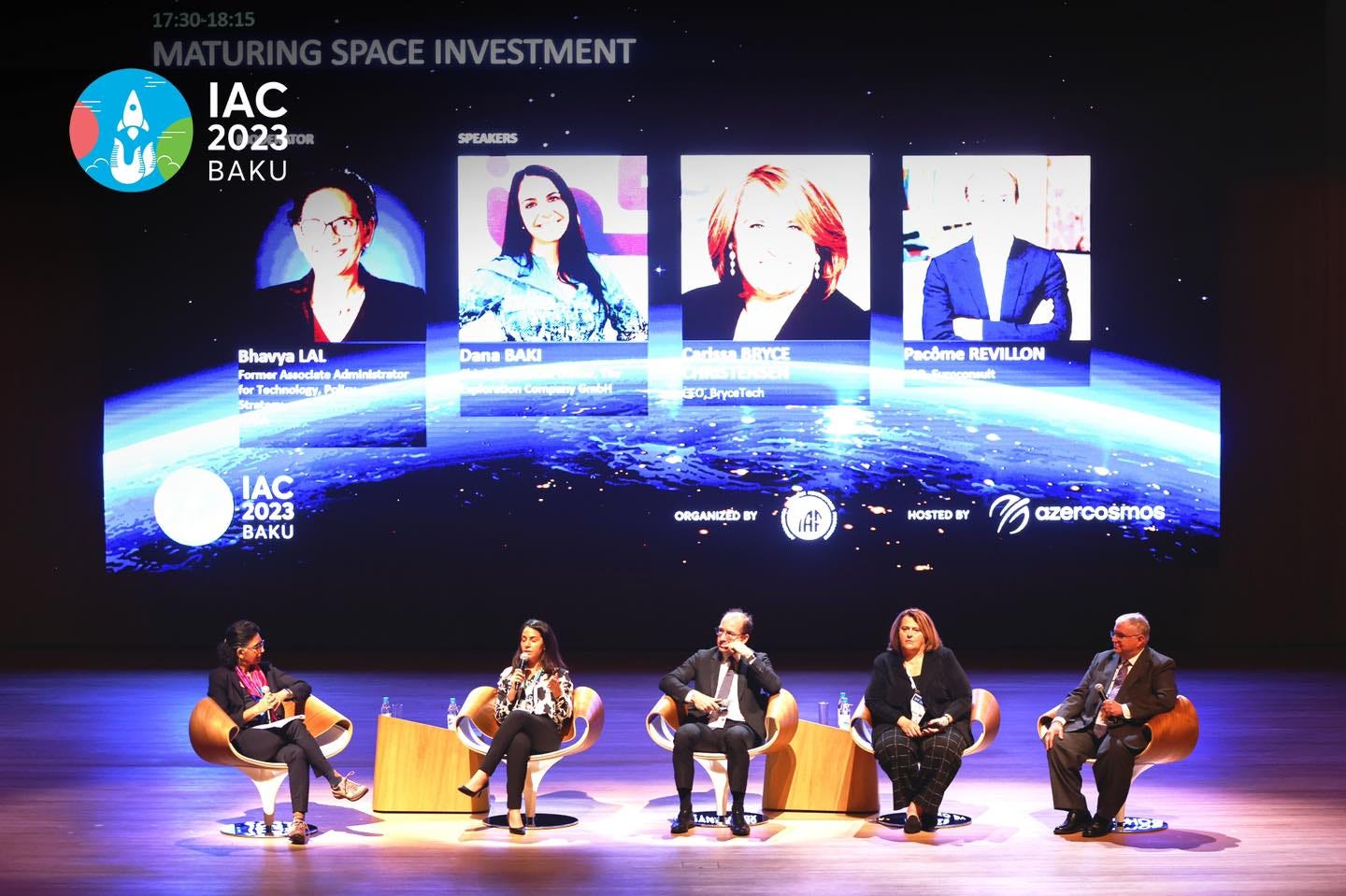IAC 2023: Unique Highlights by Space Ambition
Unveiling the latest insights from the 74th International Astronautical Congress. Explore the diverse discussions, awards, and emerging trends in the space industry.
Issue 56. Subscribers 8345. Highlights from Dr. Alessandro Golkar, Professor at the Technical University of Munich, and Taras Weinl, COO and co-founder of GATE Space.
Space Ambition attended the 74th International Astronautical Congress, which was organized by the International Astronautical Federation and hosted by the Space Agency of the Republic of Azerbaijan. The event took place at the astonishing Heydar Aliyev Center in Baku, designed by Zaha Hadid.
The congress was notable for its excellent organization and featured opening speeches by the President of the Republic of Azerbaijan, Ilham Aliyev, and the President of the International Astronautical Federation, Clay Mowry. The IAC hosted some incredible keynote lectures given by Israeli historian and author of ‘Homo Deus’ and ‘Sapiens’ books, Yuval Noah Harari, and CEO and founder of SpaceX, Elon Musk, insightful panel discussions, an investment panel held by BryceTech, and numerous discussions on space sustainability and security.
As it's almost impossible to cover every single part of the IAC, we tried to focus on those that we found significant.
The Most Diverse IAC in History
To give you an overview of the 74th IAC, we’ve packed it into a single passage. The IAC marked a spectacular return to Baku after 50 years, and while this congress wasn't as massive as the previous one in Paris by attendance, it was the most diverse IAC in history. The event hosted 5,400 delegates from 132 countries, over 7,000 visitors, more than 2,400 technical papers, and nearly 1,200 organizations participating. The event featured 150 exhibiting organizations, 17 astronauts, and 46 plenary sessions with over 50,000 viewers, joining sessions available online. Technical sessions, as usual, covered a wide range of topics in space technology, regulations, science, and technology. As Dr. Alessandro Golkar, Professor at the Technical University of Munich, says:
‘This IAC was particularly interesting because it brought together both established space players and emerging ones. Central Asia, and Azerbaijan in particular, showcased a growing interest in space activities. The congress provided a valuable opportunity to stay updated on the state of the space industry, which is currently facing various challenges. It was an incredible opportunity to see where we could go and where we should go.’
The IAF traditionally presented several awards during the event, with Elon Musk receiving the IAF World Space Award and the James Webb Telescope team receiving the IAF World Space Award for teams. Emerging space leaders were recognized, and 10 exhibition booths received different awards. Also, Türkiye won the right to host the IAC in 2026.
IAC Becomes a Platform for All: Startups, Academia, and Big Players
The IAC has historically been a platform for high-level discussions. It was a place where global trends, major challenges, and opportunities in the space industry were discussed, and official documents often signed. The event also always featured technical sessions, poster presentations, and exhibitions, making it a hub for scientific and tech engagement and networking.
Nothing in that sense has changed for the 74th IAC, nonetheless, some new trends could definitely be spotted. In particular, the event continued to attract more young professionals (from nearly 2,800 in 2018 to a whopping 4,000 in 2022) and a growing interest from the younger generation in the space domain. It also drew interest from a smaller business community, particularly early-stage startups, seeking new connections and opportunities.
Taras Weinl, COO and co-founder of GATE Space, a company developing green, chemical in-space propulsion solutions told to us:
‘For many people, the IAC is a time to step back from day-to-day business and strike up conversations with old and new connections about upcoming tech in the industry. That makes the event an invaluable platform to share developments for newcomer companies like us. This year's IAC enabled us to introduce our thrusters and propulsion systems to a broader audience and engage in countless discussions on how our products change the way we tackle satellite propulsion.’
Pitch session abstentions in 2023, could have suggested a drop in interest in startups, however, discussions around the role of government and private investments in the space industry were more prominent. Additionally, the technical sessions continued to offer a gigantic amount of groundbreaking ideas and valuable insights.
Investment Plenary Session Breaks into IAC
This year’s IAC marked a pioneering investment session, proudly hosted by an analytics and engineering firm, BryceTech. Both plenary and industry meetings involved 9 experts including CEOs of Euroconsult, Brycetech, and Astroscale. Such sessions are crucial in the space industry with the investments in the segment still maturing.
The discussions in the sessions covered the most challenging aspects of spacetech investments, the responsibilities of various stakeholders, and the importance of educating investors. The talks highlighted the significant role played by governments in spacetech development, especially following a drop in VC investments in 2022 (over 25% compared to record-breaking 2021), an even more significant drop in 2023, and a lack of late-stage investors. The space domain remains a challenge to investors due to its lower IRRs, higher development risks, longer time horizons, significant capital requirements, and lack of companies with stable and predictable cash flows.
Space Data, Sustainability, and Emerging Space Nations
The International Astronautical Congress routinely brought up some significant trends in the global space sector. While the list of these topics is not exhaustive, these discussions were a part of almost every official session and informal conversation.
A leitmotif of the congress, and arguably one of its most ambiguous parts was the topic of sustainability and security in space. While global space leaders engaged in discussions on the significance of cooperation in space and the implementation of sustainability measures, in parallel sessions, participants repeatedly pointed out the critical areas of interest.
First, a need for regulations regarding space debris and deorbiting, amid the growing number of satellites in LEO, with an additional 15% growth in 2023 so far. Another one was the importance of security measures, amid the expanding role of governments in the space sector and the rise in geopolitical risks.
The huge number of sessions dedicated to space data highlighted the importance of this topic. Discussions during the sessions explored the aspects of Earth observation, remote sensing, and space data from various perspectives. While these discussions were unfolding opportunities, Azerkosmos signed a contract with Israel Aerospace Industries, arguably the most discussed one of this IAC, for the development of another Azerbaijani Earth observation satellite – Azersky-2.
With that being said, even though a discussion about whether or not Earth observation and remote sensing can become the next $100 billion market can take place, no one can argue that applications for Earth observation, data collection, and its subsequent processing hold huge potential.
Lastly, an important subject at the congress was the role of emerging space nations. This topic appeared everywhere across the event, starting with exhibitions showcasing emerging space countries, extending to discussions held on-site at the congress, and eventually the recognition of emerging space leaders by the IAF.
Undoubtedly, the significance of these emerging space nations cannot be understated, as they are here to play an absolute role in shaping the future of the space industry.
The IAC is definitely one of the most important space events with exceptional networking opportunities and deep insights into the trends. We strongly encourage you to visit next year’s IAC in Milan, Italy on 14-18 October 2024. While the business season is approaching an end you still can visit some conferences. You can find the full list of the upcoming conferences on our web and check out our article.
If you have any questions or ideas don’t hesitate to reach us out through hello@spaceambition.org.









